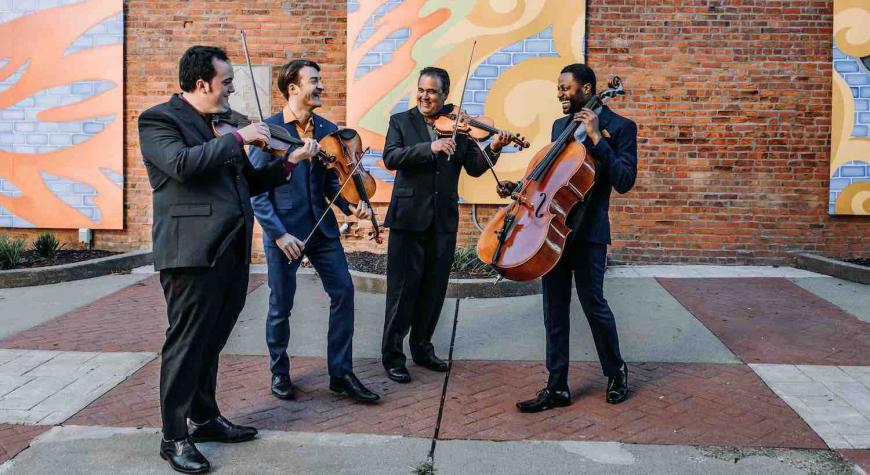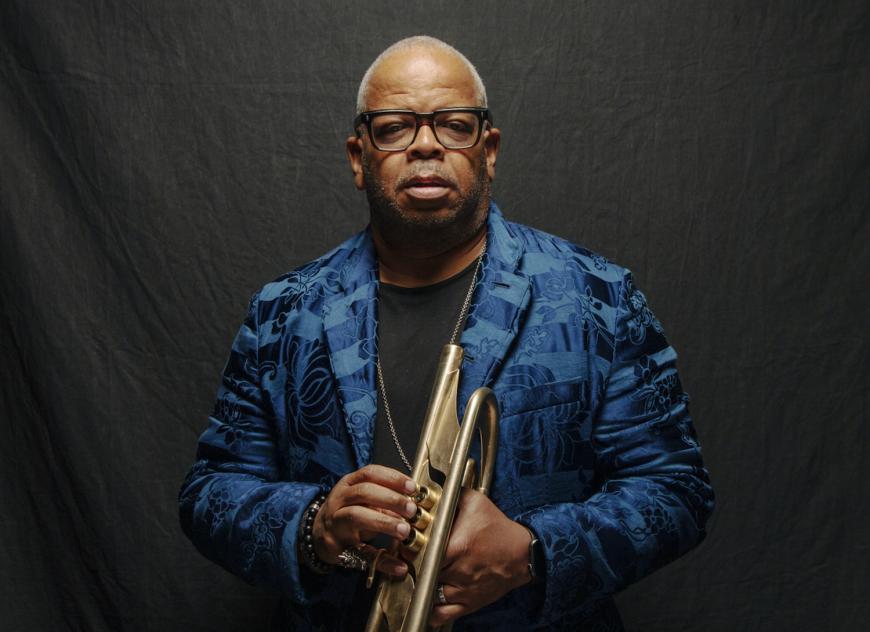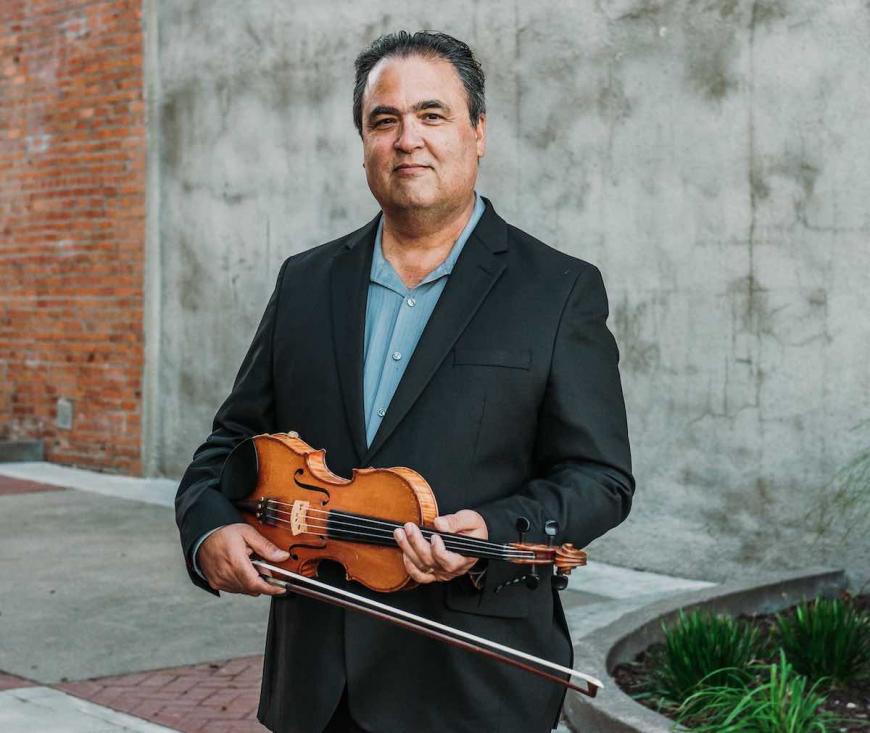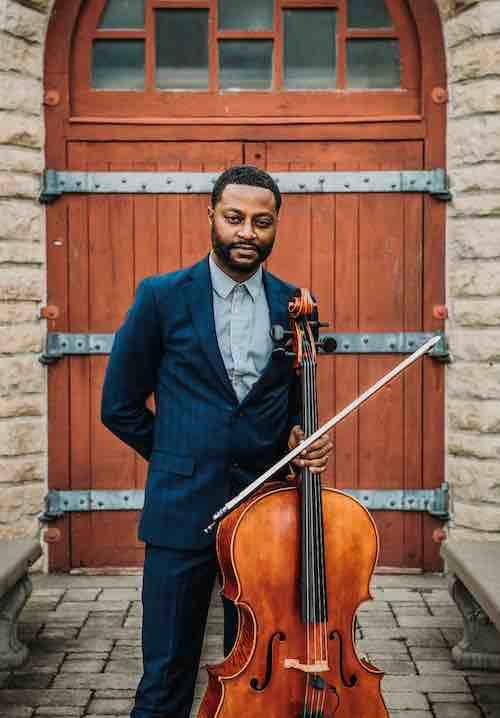
Terence Blanchard isn’t the first jazz trumpeter to record an album with strings. Among his illustrious predecessors Clifford Brown, Blue Mitchell, Freddie Hubbard, and Warren Vaché released memorable projects featuring a variety of arrangement strategies.
A prolific, Academy Award-nominated film composer and rising force in the world of opera, Blanchard wasn’t interested in sweetening the sound of his electro-acoustic E-Collective quintet. He wanted a meeting of equals, and his new Blue Note album Absence, an homage to the retired saxophone great but still-vital composer Wayne Shorter, flows from a creatively charged collaboration with violinist David Balakrishnan’s Turtle Island Quartet.
“They’re jazz musicians,” Blanchard said, noting that as soon as he opened the door for the quartet to contribute ideas and tunes, “they jumped right in.” On the skittery introduction to Blanchard’s “I Dare You,” an independent track, “the cellist [Malcolm Parson] came up with some ideas for rhythmic things for the string lines. They’re improvisational musicians who are fully conversant in jazz rhythms and phrasing.”
Shorter’s compositions only account for five of the album’s 12 tracks, with a particularly striking arrangement of his Weather Report tune “When It Was Now” by E-Collective pianist Fabian Almazan. As has long been his practice, Blanchard uses the album to showcase his bandmates, featuring tunes and arrangements by E-Collective bassist David Ginyard, Jr. and Berkeley-raised E-Collective guitarist Charles Altura. And when Balakrishnan played his 11-minute The Second Wave for Blanchard as a quick studio introduction to give the trumpeter a sense of what TIQ can do, “I was blown away and as soon as they finished, I wanted them to start playing it all over,” he said.
Absence is hardly the only major project on Blanchard’s plate. Featuring a libretto by Kasi Lemmons, his second opera, Fire Shut Up in My Bones, premieres at the Metropolitan Opera Sept. 27–Oct. 23. He recently finished the score for Spike Lee’s four-part, eight-hour HBO documentary series NYC Epicenters 9/112021½, the first episode of which premiered on Sunday. And he’s getting ready to create another set of moody, noir-steeped scores for the second season of the HBO series Perry Mason.

The project with Turtle Island came together quickly in the weeks before the first pandemic shutdown, and the release of Absence highlights Turtle Island’s enduring importance. Founded by Balakrishnan, violinist Darol Anger, and cellist Mark Summer, the group released its eponymous debut recording in 1987 with Irene Sazer on viola (the first of seven albums for Windham Hill). Originally known as the Turtle Island String Quartet, the group dropped “string” from the name after winning a Grammy Award for the 2005 Telarc album 4 + Four with the Ying Quartet.
Strangely, the pandemic hasn’t diminished the group’s local profile much as TIQ has been largely absent from Bay Area stages for years, despite the fact the quartet’s alumni are some of the nation’s most visible jazz-and-beyond string players. The viola chair has seen the most turnover, while the second violin spot has served as a launching pad for rising stars such as Evan Price, Mads Tolling, and Alex Hargreaves. Other notable ex-Turtles include violinists Jeremy Cohen, Katrina Wreede, and Tracy Silverman.

One obstacle to performing in the Bay Area is that Balakrishnan, a longtime resident of Berkeley-adjacent Albany, has been the only West-Coast-based member since Summer left the group in 2015. There are no Bay Area dates yet on the 2021–2022 calendar, but the group has stayed busy on the East Coast. And with the release of Absence, TIQ has numerous dates with Blanchard and the E-Collective (at least for now, as their high-profile New Orleans Jazz Fest concert has already fallen to the delta variant).
Rather than emulating the stability of renowned chamber-music ensembles, Balakrishnan by necessity has embraced TIQ’s intermittent churn of talent. While new members are all conservatory trained, they bring their own particular influences into the mix in the same way that say, Cuban-born pianist Fabian Almazan reconfigured Blanchard’s quintet.

The TIQ iteration that collaborated on Absence featured German-born violist Benjamin von Gutzeit, New York violinist Gabe Terracciano, and New Orleans-reared cellist Malcom Parson. A former member of the Carolina Chocolate Drops, Parson replaced founding cellist Summer, and during the recording sessions, “Terence figured out that his father and Malcom’s father went to high school together,” Balakrishnan said.
Balakrishnan still sounds a little giddy about the collaboration, which came about unexpectedly in the winter of 2019. “Terence moves very fast, and he’s incredibly prolific,” he said. “This hit us in a wave. All of the sudden we’re going to L.A. and recording a project on Wayne. We get to meet Wayne! Then COVID hits and shuts everything down hard. In between that time, Malcolm moved from New York back to New Orleans, and we were faced with replacing a member without meeting them.”
The group played its first concert with the newest member, Palestinian cellist Naseem Alatrash, earlier this month at New York City’s Bryant Park as part of the Carnegie Hall Cityside series. Born and raised in Bethlehem and based in Boston, he had already twice won “string player of the year” honors at the Palestinian National Music Competition when he started studying with Palestinian-American oud and violin master Simon Shaheen at Berklee College of Music.
“He’s got an incredible feeling for groove and great classical tone,” Balakrishnan said. “He’s coming from another culture, and you’re starting to see this a lot in the string world, violinists from India especially. He’s coming from Middle East and the way they play microtones is different. I have my own connection to Indian music, so there’s a lot of cross-fertilization, which feeds the creative process of the group.”
With a deep catalogue of original works and arrangements of music by John Coltrane, Jimi Hendrix, Thelonious Monk, and Chick Corea, the quartet was well prepared for a plunge into the mysterious and inviting universe of Wayne Shorter. In recent decades he’s gained recognition as a jazz architect of the highest order and one of the 20th century’s most influential composers. With his 88th birthday on Aug. 25, he’s still extending his legacy. On Feb. 12, 2022, Cal Performances presents the West Coast premiere of his opera Iphigenia, which features a libretto by bassist Esperanza Spalding (who also performs with Shorter’s quartet).
Absence focuses on earlier works by Shorter, exploring the post-bop territory that Turtle Island started exploring some 35 years ago. “I’m the senior Turtle playing with people younger than my kids,” Balakrishnan said. “They’re incredible musicians, with skills in so many areas. They’re expanding on what we started in the late 1970s and ’80s, going back to the Dave Grisman days integrating jazz and classical and American vernacular music.”






